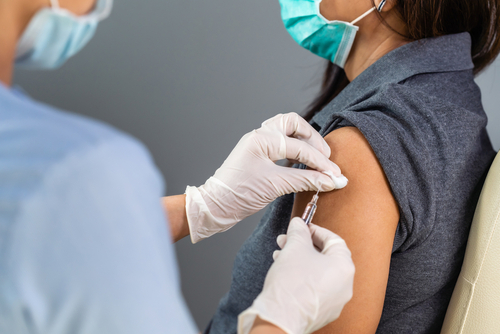
With Americans on the cusp of receiving the first doses of COVID-19 vaccinations, experts from across the public health system on Wednesday recommended specific preparedness actions be taken to ensure that the vaccines will be distributed with the most equity and effectiveness.
“There have been promising results from the current vaccine trials so far that are very encouraging,” said Anita Cicero, deputy director at the Johns Hopkins Center for Health Security. “However, we’re cognizant that there are gaps and challenges that could affect the equitable distribution of a vaccine.”
Cicero on Dec. 9 moderated the “Implementation of Mass Vaccination Campaigns in a Pandemic: Challenges and Opportunities during COVID-19” webinar presented by the Johns Hopkins Center for Health Security and the Capitol Hill Steering Committee on Pandemic Preparedness and Health Security.
Panelists during the event — which drew more than 800 online attendees, according to Cicero — focused on the implementation of mass vaccination programs in the United States, and the associated challenges and opportunities at the local, state and national levels to maximize the effectiveness and equity of administering an approved COVID-19 vaccine.
“Over the last several months, we have learned so much about pandemic preparedness… and we know that we have got to get vaccine distribution right,” said U.S. Sen. Cindy Hyde-Smith (R-MS), a Senate co-chair on the Capitol Hill Steering Committee on Pandemic Preparedness and Health Security.
U.S. Sen. Bob Casey (D-PA), another steering committee co-chair, acknowledged the skepticism that exists among Americans leery of taking a quickly produced vaccine. “We’ve got to figure out better ways to assure tens of millions of Americans about the vaccine’s efficacy,” he said, particularly among those living in high-risk communities — such as rural residents and blacks and Latinas, who are dying from the coronavirus at higher rates than white people.
One way to prepare to do that, suggested panelist Dr. Ala Stanford, founder of the Philadelphia-based Black Doctors COVID-19 Consortium, is to improve communications about the vaccine as a prerequisite to administering the vaccine.
For example, stop trying to “convince, coerce, and force” people in vulnerable communities to take the vaccine and switch to “listening, educating and being transparent,” especially with “tangible folks,” such as pastors, doctors, and other trusted leaders in black communities who are needed to advocate for why people should take the vaccine, Stanford said.
Panelist Dr. Ngozi Ezike, director of the Illinois Department of Public Health (IDPH), agreed. “Even with the best logistical plans… if we don’t have willing arms to put that vaccine in, we won’t achieve our goals,” she said. “We must grow communication lines while at the same time respecting differing viewpoints on vaccinations.”
Ezike also agreed that Americans currently mistrust both the federal government and a fast-developed vaccine. Therefore, she said, it’s important that vaccine providers be educated on how to promote the vaccine and that their questions and hesitancy about the vaccine be addressed. Otherwise, their skepticism could be passed on to patients, who may decide against getting a vaccine and then spread their skepticism outward to friends and family, “decreasing our efforts to get out a vaccine,” said Ezike.
Similarly, panelist Michael Fraser, executive director of the Association of State and Territorial Health Officials (ASTHO), also cited communicating safety and encouraging the uptake and equitable distribution of the vaccine as two major barriers to successfully administering approved vaccines to Americans.
“In a country as large as ours… we call it the last-mile problem, or the last-inch problem,” said Fraser, pointing out that unlike Britain — which this week started its mass COVID-19 vaccination campaign via its centralized health system — the United States has both a public and private “decentralized” healthcare system that may be different among states and sometimes even within the same state or in the same city. This situation will make it more difficult to ensure administration of an approved vaccine is done equitably and effectively, he said.
Moving forward, successful vaccine distribution must include a unified operational construct so that all citizens know how a vaccine will be distributed in their area, Fraser said. Such a construct should include, for instance, how information and data will be shared across all levels of state, local, territorial, and tribal governments, the public, and the healthcare system, as well as how public health capacity will be scaled up now to ensure the U.S. vaccine campaign is successful everywhere.
And to support such a massive scale-up, there must be a sizable workforce, which also means sizable investments should be appropriated by Congress to make that happen, said Fraser.
His group ASTHO, along with the Association of Immunization Managers, recently requested that federal lawmakers approve at least $8.4 billion for COVID-19 vaccination distribution, plus an additional $500 million for seasonal influenza operations, in the next emergency supplemental funding package.
“These funds are urgently needed to expand and strengthen federal, state, local, territorial, and tribal capacity for a timely, comprehensive, and equitable vaccine distribution campaign,” wrote the organizations’ leaders in an Oct. 15 letter sent to congressional leaders. “It is important to note this funding request is updated from our estimate provided earlier this summer to reflect emerging information from the vaccine clinical trials, current public health agency priorities, and the need to bolster public confidence in a COVID-19 vaccination campaign.”
Fraser called the federal funds “absolutely critical” to effectively distributing vaccines to everyone. ”We need sustained investments to sustain the process,” he said.
Added U.S. Sen. Richard Burr (R-NC), another steering committee co-chair, during the webinar: “We can’t take the collective foot off the gas of COVID-19. We will get a failing grade if we don’t ask questions now that reflect on what has happened, what we need to do, what the takeaways are, and what we should set up now for the future.”




